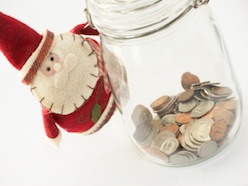
While some people try to shed a few pounds gained over the holidays, Canadians should also start the new year making sound financial resolutions.
According to the 2012 BMO Holiday Spending Outlook, 12% of Canadians plan to borrow during this period and indicate this is the only time of the year where they spend beyond their means.
Over a third of those polled (37%) believe they can catch up during the new year, while more than half think they will have a remaining debt.
Read: Consumer confidence holds steady
“It is important for each of us to evaluate our financial situation after the holidays and take advantage of online resources to ensure closer monitoring of our discretionary spending and take appropriate resolutions,” says Su McVey, vice president, BMO Bank of Montreal.
McVey stresses the need for Canadians to better plan their budget in 2013, shorten the payment of debts associated with holiday season purchases and avoid such a recurrence next year.
Here are some tips on how to achieve this:
Reduce discretionary expenses: Buying a coffee en route to work or eating every lunch at a restaurant can be expensive. If you set aside the $10 you spend every day with your meal and your coffee, you could save $2,600 each year. Even if you bring your lunch four days a week and eat at the restaurant on Friday, you still save $2,080 per year.
Space your payments: In order not to lose track of your recurring payments, try to stagger them so that you do not have to pay a significant amount each time. This will leave a little air to breathe, and avoid having liquidity problems for your daily expenses.
Read: Don’t let your holiday party run wild
Taxes: If your municipality allows it, pay your taxes by monthly or quarterly installments.
Insurance premiums: Consider making the payment of insurance premiums over 12 months.
RRSPs: It is possible to contribute to RRSPs throughout the year. Do not hesitate to choose a direct debit option, which will remove a pre-determined amount on each of your paycheques to contribute to your RRSP.
Tax Free Savings Account (TFSA): When you contribute to your TFSA, investing small amounts at regular intervals is better. Over time, even small contributions of $50 or $100 will eventually accumulate.
Have an emergency fund: Planning an emergency fund can help ensure that you will be able to cope with unexpected expenses in the future, and will not have to incur debt. The general rule is to set aside the equivalent of three to six months of your income so you can use it in case of unexpected expenses.
Consolidate debt: More than ever, households are looking for ways to reduce costs and save money. By consolidating their higher-interest debt into a single monthly payment with a low-interest rate personal line of credit, Canadians can reduce their interest charges and repay their debt substantially faster.